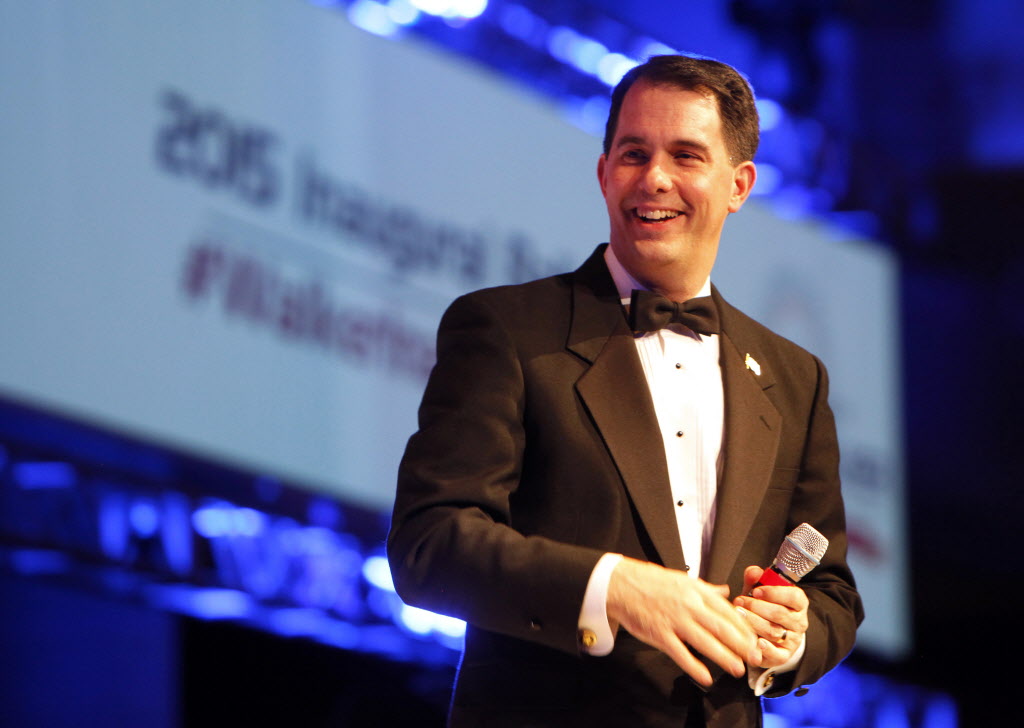As he launches his bid for a third term, Gov. Scott Walker defended his record on job creation, telling WisPolitics.com the record number of people employed in Wisconsin shows he’s put the state back to work.
Democrats have regularly knocked Walker because after seven years in the Capitol’s East Wing, he’s still short of his pledge to create 250,000 jobs during his first four years in office. The state also has regularly lagged behind other Midwestern states for the rate at which jobs are created.
But Walker, who was to formally launch his campaign Nov. 5, pointed to the nearly 3 million people employed in September as evidence of his success. While Wisconsin added fewer than 180,000 jobs during Walker’s first seven years, Walker called his original pledge a “lofty goal.”
“If our goal was to get people working again, regardless of what the number shows, we’ve succeeded in that regard,” Walker said in an interview Saturday.
>> WisPolitics is now on the State Affairs network. Get custom keyword notifications, bill tracking and all WisPolitics content. Get the app or access via desktop.
Following Sunday’s announcement in Waukesha, Walker will travel the state on his announcement tour, hitting cities from Hudson and Rhinelander to Sheboygan and Janesville.
Assembly Minority Leader Gordon Hintz said Walker’s job claims are misleading.
The Oshkosh Democrat noted the state has more residents than ever before, which has led to the record number of people employed, and charged Wisconsin has failed to invest in infrastructure such as transportation and broadband, leading to people going elsewhere for work.
“It’s not surprising to see why Wisconsin is not attracting people,” Hintz said. “We have a labor shortage because we can’t attract people to the state. The governor’s policies go a long way toward explaining that reason.”
Walker said one of the state’s biggest challenges now is not job creation, but filling the jobs available, and he would make that the focus of a third term.
To address that, Walker noted the state has focused on three areas: traditional growth through investing in education, including the $639 million Republicans put into K-12 education for the 2017-19 budget; helping those with disabilities enter the workforce; and changing welfare programs, such as mandating drug testing and work requirements, to encourage more people to move off government assistance and into the workforce.
Hintz countered Walker has had the luxury of governing during one of the longest sustained period of growths in U.S. history. But he charged Walker has failed to adequately invest in priorities such as K-12 education and the UW System, while the drug testing was to “ideologically punish those who have drug problems and pander to a base that wants to kick people off public assistance programs.”
Walker helped lure Taiwanese manufacturer Foxconn to Wisconsin with a nearly $3 billion incentive package aimed at attracting a $10 billion investment in the proposed plant and the addition of up to 13,000 jobs. Critics have questioned whether the state will recoup its investment and if Foxconn will deliver on its promises.
But Walker told WisPolitics.com the existing job openings in Wisconsin along with the additional jobs Foxconn could offer means the state will have to look at investing more in marketing Wisconsin to bring more workers into the state. He also said Foxconn could actually help Wisconsin attract workers by sending a message there are opportunities here.
“That to me is a challenge that I’m happy to talk about,” Walker said, comparing the state’s unemployment rate, 3.5 percent in September to the 9.2 percent during the “Great Recession” while Dem Jim Doyle was governor.
Walker, who began to explore a run for the presidency shortly after winning re-election in 2014, said he is “100 percent going to serve a full term” if re-elected, but did not close the door on running for a fourth term if he wins.
Walker has said he would serve no more than three terms as governor. But in Saturday’s interview with WisPolitics.com, he would only say it would be “pretty realistic” to think he would not seek a fourth term if victorious a year from now.
“We’ll see about whether or not this is the last term,” Walker said. “We’ll probably talk about that over the next year. But I’m 100 percent committed to serving my full term.”
Walker’s poll numbers fell through 2015 as he left the state to campaign for president. His numbers have begun to rebound in the Marquette University Law School Poll, which had his job approval at 48 percent in June, while 48 disapproved of his performance. In March, it was 45-48.
Walker said he is not going to run for president with his party in the White House and he had no interest in serving in the cabinet, a suggestion he said has been made to him several times since Donald Trump won the presidency.
Walker’s 2010 and 2014 wins — sandwiched around winning a recall election in 2012 — came amid GOP waves with President Barack Obama in the White House. But his bid for a third term will come under a Trump presidency. That has prompted questions over whether Republicans will face significant headwinds in 2018, particularly with the president’s poor poll numbers. The June Marquette Law poll had Trump’s job approval at 41 percent.
When asked if he wanted Trump to campaign with him next year, Walker said his focal point will be making his own case for re-election and not relying on surrogates to make his case for another term.
“I think we’ve done a remarkable amount of work to turn the state around to be part of the Wisconsin comeback, but there’s still work to be done,” Walker said. “I’d like the state to move forward, not backward. It’s all about the relationship between me and the citizens of Wisconsin.”


